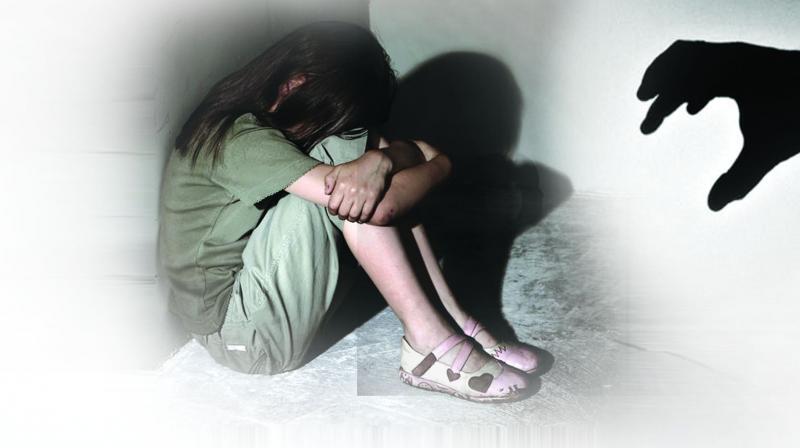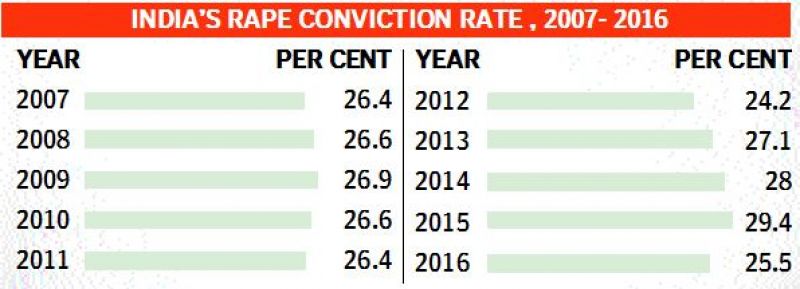In India, death row cases dealt extremely slowly

Hyderabad: The 2012 barbaric Delhi rape case has come close to its end, with the Supreme Court dismissing the review petitions of the accused. Even though the case went through a fast track court, accelerated by the mood of the nation, it took six years to reach its closing stage.
There are at least 477 prisoners awaiting death sentence in the country. India’s rate of executing the death penalty is low; in the last decade (2007- July 4, 2018) only three executions (hangings) were carried out.

Some 132 death sentences were handed down each year by the courts, but the Supreme Court confirms barely three or four death sentences each year, according to the National Crime Records Bureau. Since the accused are allowed a cycle of appeals and approvals are also pending with the President’s office, the number of cases on death row tend to pile up.
According to a report titled ‘The Death Penalty Database- India’, by Cornell Law School in the US, as of 2016-17 there are at least 477 individuals under sentence of death.
Speaking to Deccan Chronicle Navkiran Singh, human rights lawyer practising in the Haryana & Punjab High Court, explained, “The accused always gets an opportunity to seek pardon before the President of India, who has the right to forgive. Most Presidents try not to decide on the pardon petition for various reasons including opposition to the death sentence by many people, especially human rights activists who believe that the death sentence does not act as a deterrent. The system also gives the
opportunity to the accused to approach the highest court of law to get the death sentence converted to life imprisonment.”
Lawyer Arvind Bhardwaj points out that several cases are delayed and pending because there is no legal aid during the trial.
“This apart, if cases are linked to any kind of political motivation, they proceed at a faster rate. Many times the pardon petition is pending with the President’s office due to the delay caused by the council of ministers that is supposed to assist the President in decision making,” he said.
Rape has lowest conviction rate in India among others
DC Correspondent
Hyderabad, July 10
Among all cognizable crimes in India, rape has the lowest conviction rate. The overall rate of conviction of rape cases in India stands at 25.5 per cent as on December 2016.
If the death sentence is carried out on those convicted in the 2012 Delhi rape case, it will be the first time the death penalty has been executed in a case of rape. This was made possible by the ordinance and later act under which rape is punishable by death.
Aparna Reddy, a criminal lawyer, says poor conviction rates are due to shoddy investigations by the police. “With a weak chargesheet, victims are not able to get legal representation during a trial. Thus either there is a delay in the case or the accused gets acquitted. Also, declining conviction rate in rape cases ordinarily means fewer registered cases could be proved in court.”
“Stringent implementation of laws and strict policing may help in reducing rape incidents, but the real change will come when abusers and rapists are consistently convicted for their crimes,” says Sathvika Rao, member of a city based women and child welfare organisation.
Some 2,78,886 rape cases have been reported in India over the last 10 years under Section 376 of the Indian Penal Code. The conviction rate for rape, at 25.5 per cent, remains low compared to all cognisable crimes.
Also, so far no convicted rapist has been hanged. In 2013, then President Pranab Mukherjee passed an ordinance approving the death penalty if a rape leads to death or if it leaves the victim in a persistent vegetative state. Repeat perpetrators of aggravated rape also face capital punishment under this ordinance.
The ordinance became law in April 2013 as the Criminal Law (Amendment) Act, 2013. The three convicted in the rape, mutilation and death of a young woman in Delhi five years ago could be the first to be executed for this crime.

